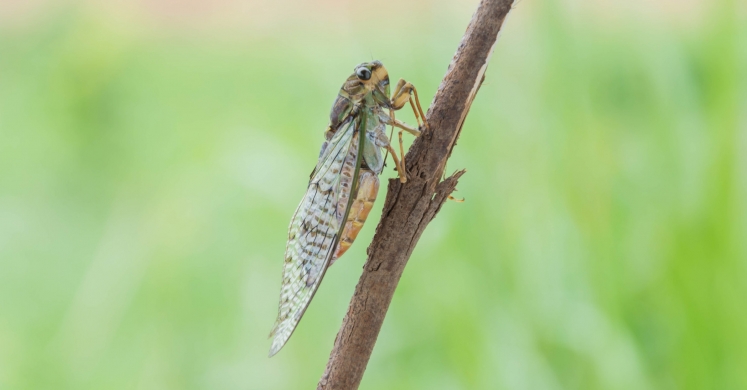Phipps Stories

#bioPGH Blog: Periodical Cicadas
 A resource of Biophilia: Pittsburgh, #bioPGH is a weekly blog and social media series that aims to encourage both children and adults to reconnect with nature and enjoy what each of our distinctive seasons has to offer. From the best times to plant seasonal flora and enjoy their peak blooms, to astronomical events and creatures to keep an eye and ear out for, Phipps will keep you in the know with what’s going on in our environment!
A resource of Biophilia: Pittsburgh, #bioPGH is a weekly blog and social media series that aims to encourage both children and adults to reconnect with nature and enjoy what each of our distinctive seasons has to offer. From the best times to plant seasonal flora and enjoy their peak blooms, to astronomical events and creatures to keep an eye and ear out for, Phipps will keep you in the know with what’s going on in our environment!
It’s about to get a bit buzzier in Western Pennsylvania as a brood of periodical cicadas prepares to make their return to the soil’s surface. Periodical cicadas are a rather unique group of insects as they are only found along the eastern portion of North America, and only appear every 13 – 17 years! There are seven distinct species of periodical cicadas, of the genus Magicicada, that inhabit eastern North America. Four species go through a 13-year lifecycle and three species go through a 17-year lifecycle. This year, Pittsburgh will play host to Brood V, which is comprised of the three species of 17-year cicadas: Magicicada septendecim, Magicicada cassini and Magicicada septendecula. Entomologists, or individuals that study insects, had assigned periodical cicadas into numeric groupings, dubbed “broods,” based on the length of their lifecycles and the calendar year during which they last emerged in order to better track the next scheduled emergence of each species. If you’re doing the math, and simply subtract seventeen from 2016, you’ll come to find that the Brood V cicadas haven’t been topside since the summer of 1999! So when exactly will these insects begin to emerge, you may ask? Brood V is expected to emerge in early May, once soil temperatures reach approximately 64-degrees Fahrenheit, and will only remain with us for about four to six weeks before their lifecycle comes to an end. If you want to experience the spectacular emergence of these large black-bodied, red-eyed insects you need not venture far as the emergence of the Brood V periodical cicadas is specific to the southwestern portion of Pennsylvania, the eastern half of Ohio, the majority of West Virginia, northern Virginia and select regions surrounding the Chesapeake Bay.
Connecting to the Outdoors Tip: Although these large insects may appear a bit intimidating, they’re actually completely harmless to anything that is not a plant and they are quite sociable. These mass emergences are not only a unique site and sound to be beheld by humans, they also provide a considerable smorgasbord for a variety of other species. So you may also see an increase in animal activity as several species of mammals, birds, fish, reptiles, amphibians and even other insects appear to munch on the plethora of newly emerged, as well as deceased, cicadas. If you’d like to catch a glimpse of these cicadas simply keep your ears peeled as the males will begin chorusing for females shortly after molting, which will lead you right to their location. With so many cicadas out and about, consider utilizing cicada shells, living insects and even deceased ones to demonstrate to little ones the anatomy of insects and even as models for artwork. If you’re really adventurous, the University of Maryland has even produced a cookbook filled with cicada-based recipes to try, such as: banana cicada bread, cicada stir-fry and cicada-rhubarb pie. If you are looking to expand your culinary repertoire and try these recipes, however, be aware that it is possible to have a cicada allergy and not realize it! No matter how you plan to enjoy the return of these long-lived insects, just remember they’ll only be visible for a few short weeks and then gone again until the next generation emerges in 2033.
Continue the Conversation: Share your nature discoveries with our community by posting to Twitter and Instagram with hashtag #bioPGH, and R.S.V.P. to attend our next Biophilia: Pittsburgh meeting.
Additional Resources:
Periodical Cicada - Department of Entomology - Penn State University
Periodical Cicada (17-Year Cicada) - Chicago Botanic Garden
Mapping Periodical Cicadas
The Food Chain Game - Kids Corner
Why Do Cicadas Sing? - LiveScience
Making the Most of Cicada Season - Mother Natured
Cicada-licious: Cooking and Enjoying Periodical Cicadas - University of Maryland

